| Article ID | Journal | Published Year | Pages | File Type |
|---|---|---|---|---|
| 3335249 | Transfusion and Apheresis Science | 2012 | 5 Pages |
Treatment of blood products by riboflavin and ultraviolet (UV) light prevents of white blood cell (WBC) replication and inactivates of pathogens. The aim of this study was to determine the effects of the inactivation by riboflavin and UV light upon plasma clinical performance, based on effect on the pretransfusion international normalized ratio (INR).A prospective, controlled randomized study included 60 patients who received transfusion of plasma on the Clinic for hematology of Clinical Centre in Nis. Experimental group (EG; 30 patients) was treated with Mirasol-inactivated fresh frozen plasma (FFP) and control group (CG; 30 patients) was transfused with noninactivated FFP. Besides pretransfusion vs. posttransfusion INR, the improvement in INR patient’s plasma level per one FFP unit transfused was evaluated. Total of 68 units of FFP were transfused to patients of CG (2.24 ± 0.83 units per patient). Patients of EG received 84 units of Mirasol-inactivated plasma (i.e. 2.80 ± 1.19 units per patient). There was significant increase in number of FFP transfusions that normalized coagulation parameters in EG compared to CG (p = 0.039). Also, there was a significant improvement of INR after every FFP unit application (p = 0.046). We found a linear relationship between pretransfusion INR and improvement of INR (r = 0.97; p < 0.001).Plasma treated with riboflavin and UV light retains hemostatic competence and can be used efficiently in the therapy of congenital or acquired coagulopathies, but in larger quantity as compared to noninactivated FFP volume.
